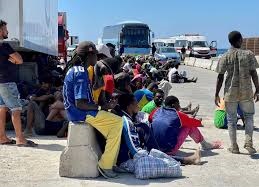Italy: New report shows a ‘fear of migrants’ in more than half of respondents

Rome: A new report from Italy’s independent private social research institute Censis, demonstrates a “growing concern” among Italians about the numbers of migrants arriving in the country.
Italy’s independent private social research institute Censis published its latest study on societal attitudes among the Italian population on December 6. The report reflects attitudes among respondents for 2024.
The report also reflected on demographic changes in Italy. In 2023, children born in Italy to at least one parent with a foreign passport numbered 80,942, around 21.3 percent of all births, or one in five children born.
There were almost a million children registered in Italian schools who do not hold Italian citizenship for the school year 2023/2024. Families with at least one foreign parent numbered 2.6 million, around 10.1 percent of all families in Italy.
Despite these changes, the report highlighted a “growing concern” about the numbers of migrants arriving in Italy among just over half of respondents.
Global events, which also influence policies in Italy, as well as the numbers of migrants who might attempt to migrate to the country were seen to be “putting pressure” on Italian government policy.
The latest report also identified what they termed a “crisis of the middle class,” which they said can affect the numbers of people willing to participate in elections and actually vote. In summary, the report authors believe that Italian society is becoming increasingly concerned and going through some profound changes.
Never before has the political compass of Italian politics been so tied to issues at an international level, note the report’s authors. It is not a coincidence, they believe, that for 49.6 percent of Italians, the future will be conditioned by climate change and catastrophic weather events, but also for 46 percent by the results of the war in the Middle East and by the risk (47.5 percent) of the economic and financial global crises.
The issue of migration also weighed heavily on many respondents’ minds. Many citing what they called “identity issues” as a particular problem that was influencing the socio-political discourse of the country.
In fact, 57.4 percent of respondents said they felt “threatened by those who want to create in our countries rules and habits that are in contrast with the consolidated Italian lifestyle, for example, the separation between men and women in public places or wearing the integral Islamic veil.”
Furthermore, there is also a percentage of 38.3 percent of Italians that feel threatened by those who want to facilitate the entrance of migrants; and 29.3 percent that views as an enemy those who hold different family concepts from the traditional family.
According to those who conducted the study, these differences can transform “into fractures and could degenerate into an open conflict.”
“In the last ten years, nearly 1.5 million new Italian citizens have been integrated who were previously foreigners,” noted the report’s authors.
Italy currently tops the EU tables for issuing citizenship rights to new citizens. In 2023, stated the report, that number stood at 213,567. Spain, in comparison issued around 181,000 the same year, and Germany 166,000. In France, around 114,000 new citizenships were issued and 92,000 in Sweden.
In 2022, Italy issued around 21.6 percent of all new citizenships issued across the entire EU bloc. That year, the total number stood at around one million across the bloc.
Interestingly, the report also noted that around 40 percent of Italians believe that Italians are racist. More than half believed that that racism was increasing. More than half of second generation Italians, those who were born in Italy but who have at least one foreign parent, believe that Italians are racist. Three quarters of them said they knew someone who had been a victim of discrimination. Xenophobic or racist hate crimes have indeed increased in the last ten years, the report noted.
Many of these attitudes, believe the report’s authors, come from a lack of education in Italian society. The report noted declining educational levels across the board in Italy, in terms of general knowledge about the rest of the world, as well as a growing number of students not meeting the required levels of Italian for their age. Some of these people, the report believed, were more likely to hold erroneous beliefs about migrants. Just over a quarter of Italians believe that there are more than 10 million irregular migrants in Italy today. And around eight percent of Italians believe that Islam and Jihadism are the same thing.





